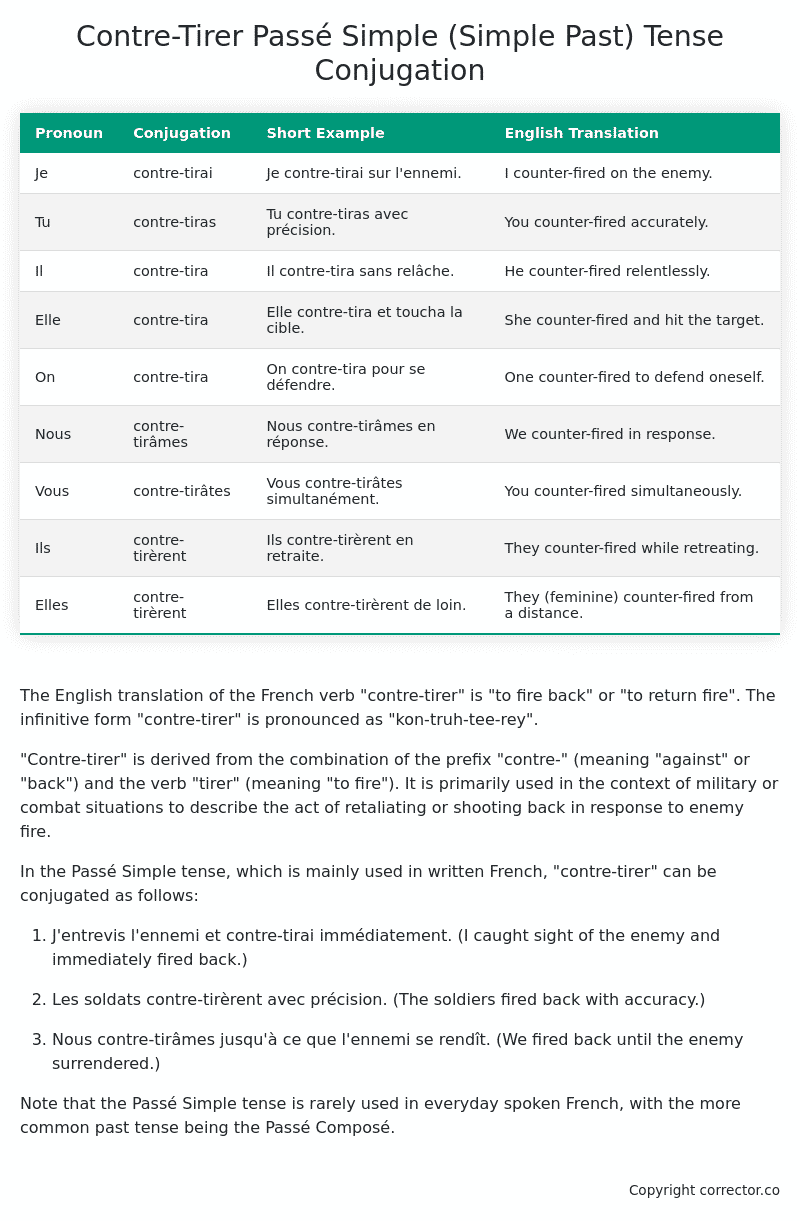Passé Simple (Simple Past) Tense Conjugation of the French Verb contre-tirer
Introduction to the verb contre-tirer
The English translation of the French verb “contre-tirer” is “to fire back” or “to return fire”. The infinitive form “contre-tirer” is pronounced as “kon-truh-tee-rey”.
“Contre-tirer” is derived from the combination of the prefix “contre-” (meaning “against” or “back”) and the verb “tirer” (meaning “to fire”). It is primarily used in the context of military or combat situations to describe the act of retaliating or shooting back in response to enemy fire.
In the Passé Simple tense, which is mainly used in written French, “contre-tirer” can be conjugated as follows:
-
J’entrevis l’ennemi et contre-tirai immédiatement.
(I caught sight of the enemy and immediately fired back.) -
Les soldats contre-tirèrent avec précision.
(The soldiers fired back with accuracy.) -
Nous contre-tirâmes jusqu’à ce que l’ennemi se rendît.
(We fired back until the enemy surrendered.)
Note that the Passé Simple tense is rarely used in everyday spoken French, with the more common past tense being the Passé Composé.
Table of the Passé Simple (Simple Past) Tense Conjugation of contre-tirer
| Pronoun | Conjugation | Short Example | English Translation |
|---|---|---|---|
| Je | contre-tirai | Je contre-tirai sur l’ennemi. | I counter-fired on the enemy. |
| Tu | contre-tiras | Tu contre-tiras avec précision. | You counter-fired accurately. |
| Il | contre-tira | Il contre-tira sans relâche. | He counter-fired relentlessly. |
| Elle | contre-tira | Elle contre-tira et toucha la cible. | She counter-fired and hit the target. |
| On | contre-tira | On contre-tira pour se défendre. | One counter-fired to defend oneself. |
| Nous | contre-tirâmes | Nous contre-tirâmes en réponse. | We counter-fired in response. |
| Vous | contre-tirâtes | Vous contre-tirâtes simultanément. | You counter-fired simultaneously. |
| Ils | contre-tirèrent | Ils contre-tirèrent en retraite. | They counter-fired while retreating. |
| Elles | contre-tirèrent | Elles contre-tirèrent de loin. | They (feminine) counter-fired from a distance. |
Other Conjugations for Contre-Tirer.
Le Present (Present Tense) Conjugation of the French Verb contre-tirer
Imparfait (Imperfect) Tense Conjugation of the French Verb contre-tirer
Passé Simple (Simple Past) Tense Conjugation of the French Verb contre-tirer (You’re reading it right now!)
Passé Composé (Present Perfect) Tense Conjugation of the French Verb contre-tirer
Futur Simple (Simple Future) Tense Conjugation of the French Verb contre-tirer
Futur Proche (Near Future) Tense Conjugation of the French Verb contre-tirer
Plus-que-parfait (Pluperfect) Tense Conjugation of the French Verb contre-tirer
Passé Antérieur (Past Anterior) Tense Conjugation of the French Verb contre-tirer
Futur Antérieur (Future Anterior) Tense Conjugation of the French Verb contre-tirer
Subjonctif Présent (Subjunctive Present) Tense Conjugation of the French Verb contre-tirer
Subjonctif Passé (Subjunctive Past) Tense Conjugation of the French Verb contre-tirer
Subjonctif Imparfait (Subjunctive Imperfect) Tense Conjugation of the French Verb contre-tirer
Conditionnel Présent (Conditional Present) Tense Conjugation of the French Verb contre-tirer
Conditionnel Passé (Conditional Past) Tense Conjugation of the French Verb contre-tirer
Conditionnel Passé II (Conditional Past II) Tense Conjugation of the French Verb contre-tirer
L’impératif Présent (Imperative Present) Tense Conjugation of the French Verb contre-tirer
L’impératif Passé (Imperative Past) Tense Conjugation of the French Verb contre-tirer
L’infinitif Présent (Infinitive Present) Tense Conjugation of the French Verb contre-tirer
L’infinitif Passé (Infinitive Past) Tense Conjugation of the French Verb contre-tirer
Le Participe Présent (Present Participle) Tense Conjugation of the French Verb contre-tirer
Le Participe Passé (Past Participle) Tense Conjugation of the French Verb contre-tirer
Struggling with French verbs or the language in general? Why not use our free French Grammar Checker – no registration required!
Get a FREE Download Study Sheet of this Conjugation 🔥
Simply right click the image below, click “save image” and get your free reference for the contre-tirer Passé Simple tense conjugation!

Contre-Tirer – About the French Passé Simple (Simple Past) Tense
Formation
Usage
Narration
Historical Context
Interactions with other tenses
Passé Composé
Imparfait
Conditional and Subjunctive
Summary
I hope you enjoyed this article on the verb contre-tirer. Still in a learning mood? Check out another TOTALLY random French verb conjugation!


